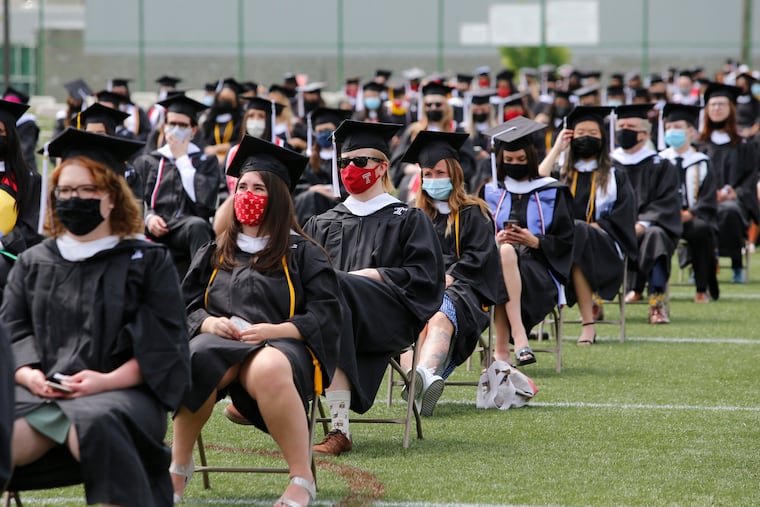More millennial college grads stayed in Philly. Will Gen Z follow suit?
Millennials drove a big increase in college-educated young people in Philadelphia. Will the city and region be able to keep that going with a smaller Generation Z cohort?

Even with dozens of colleges and universities in the Philadelphia region, the city’s population of college-educated young adults had dipped below 60,000 at the start of the millennium, with only about a quarter of area grads sticking around.
Since then, the number of people aged 25 to 34 with college degrees has more than doubled in Philadelphia, according to a new report by Campus Philly, an organization focused on keeping graduates of local higher education institutions from leaving the region. It’s increased by more than two-thirds when looking at the whole Philadelphia region, the report found.
“Twenty years ago leaders in Philadelphia came together to really look at the issue of brain drain in Philadelphia,” said Jennifer Kebea, president of Campus Philly. “Colleges and universities really started to pay attention to this number.”
Philadelphia’s population of people between the ages of 25 and 34 with a bachelor’s degree grew by 155% from 2000 to 2021 — to a total of 152,200 people.
In counties surrounding Philadelphia, the same demographic grew by about 43%, to 293,500 people.
The growth is due in part to the size of the millennial generation — bigger than baby boomers — and the fact that a lot of them went to college. But it’s not a given that college grads will stay in the city where they were educated.
The trajectory from 2000 to now is a reversal of the trend from 1990 to 2000, when Philadelphia lost a net 3,400 young college grads.
“There are absolutely more millennials who are earning college degrees for sure, and they’re also choosing to stay in this region,” Kebea said.
The 155% growth in 21 years was more than other large cities in the U.S., and well above the national average of 62%.
Why college grads matter to the region
Among city residents in the 25 to 34 age range, people with bachelor’s degrees are the largest group, making up 31.7%. Nearly 20% have a graduate or professional degree.
College graduates make more money on average. In Philadelphia and the surrounding region, annual earnings for people with bachelor’s degrees are more than twice a high school graduate’s earnings, on average, Campus Philly’s report said.
Some of that money then circulates through the local economy and some of it translates to tax revenue. According to the report, economic activity related to the additional income of college graduates supports 55,100 jobs in the region and $715 million in tax revenue for the city, Pennsylvania, New Jersey, and Delaware.
Despite these gains in education and income, Philadelphia remains the poorest big city in America. Kebea acknowledged this, noting that a variety of organizations and stakeholders are working together on that problem.
Recently, state, local, and federal government leaders have been placing emphasis on creating well-paying jobs that don’t require a college degree, and leaders in the trades have been trying to get more diverse entrants to their apprenticeship programs. Those efforts live in harmony with Campus Philly’s efforts because the city needs workers in all kinds of careers in order to reach its goals, Kebea said.
“Campus Philly’s lane is still going to be in ensuring we’re supporting the retention of college graduates,” she said.
How will hybrid work and Gen Z affect Philadelphia’s college grad retention?
Kebea noted that the impact of the COVID-19 pandemic and increase in remote and hybrid work arrangements is not fully reflected in the data available for this report, which was collected in 2020 and 2021. The city and region saw migration in and out as a result of that shift in workplace norms, she noted.
“I don’t know if we as a region understand the effects of that migration” yet, she said. “I think effects of the pandemic will have a ripple on workforce development across cities.”
Another significant factor could influence the trajectory of Philadelphia’s college-educated population: Generation Z, those born between 1997 and 2012.
Gen Z is smaller in number than the millennials. To maintain the population of college-educated young people, those with bachelor’s degrees will have to make up a greater proportion of the region’s young-adult residents. That means getting local teens on a path to college, making new Philly-area college graduates want to stay in the region, and convincing college grads from other places to move in, Campus Philly’s report said.
It doesn’t have to mean ditching office work entirely. A lot of Generation Z workers and millennials prefer to work in some kind of hybrid environment, and many of them want autonomy in deciding how often they go to the office, a recent Deloitte survey found.
“We need to be doing more of what we’ve been doing all along … amplifying the city as a place to be,” Kebea said. “At the same time, when we think about young people ultimately wanting to move into certain career paths, flexibility is going to be an important factor.”